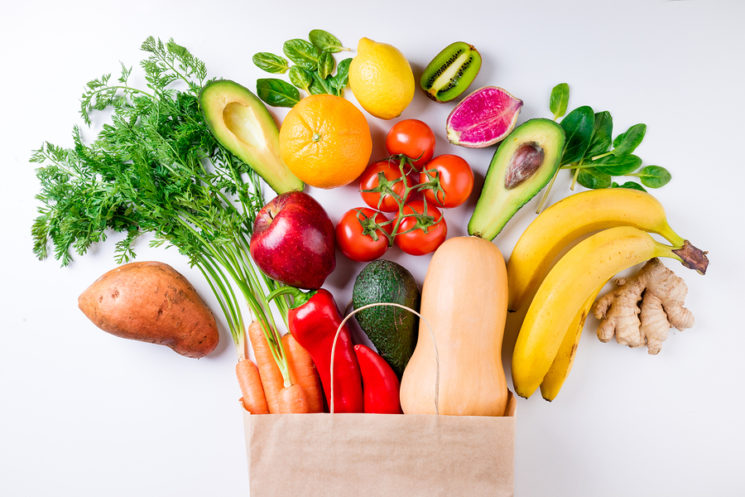Every brain changes over time, but smart routines and practices can keep our minds young, sharp and healthy, even in our later years.
We are all empowered with brain plasticity, or neuroplasticity. This wonderful, innate ability gives us the potential to change at any time in our lives. While aging may weaken certain neural connections, the persistent practice of good habits can enhance and even build new pathways.
Here are 6 ways to strengthen your mind.

A smiling woman running in a park.
1. Exercise daily.
If we’ve heard it once, we’ve heard it a million times — exercise is good for you. It’s impossible to exaggerate the positive benefits of a habit that helps young and old alike. Research shows that staying active promotes healthful aging, and helps both brain and body.
Physical activity helps blood flow to your brain and forges new connections between its many cells. Even bursts of exercise as brief as 10 minutes can temporarily enhance energy levels, focus, problem-solving, and memory.
Sharpen your reasoning and thinking skills and boost your overall well-being while you’re at it. Start with a commitment to mild or moderate physical activity for 25 to 30 minutes each day, such as walking or yoga. Pair with your favorite music or audiobook to help you enjoy the time.

Healthy fruits and vegetables in paper grocery bag.
2. Eat well.
Nutrition begins at the table. Make sure you sit down to foods that nourish your mind, as well as body. For a delicious and brain-boosting diet, look no further than the Mediterranean-style plate, rich in fruits, fish, vegetables, whole grains, nuts, beans and olive oil.
Enjoying a Mediterranean-style diet has been shown to decrease the likelihood of cognitive decline, reduce the risk of some neurodegenerative illnesses and to overall enhance brain function.
Stay away from or moderate your intake of high-calorie, highly-processed foods. Such foods can frustrate your cholesterol levels, blood sugar levels, and the balance of nutrients that helps your brain operate at its best.
Make conscious, small changes where possible, by switching to or substituting ingredients with healthful options. Find unique recipes that help you look forward to your meal. While eating, savor your bites.

Closeup of artist with palette and brush painting colorful still life.
3. Keep learning.
The practice of new skills stimulates your mind and keeps it strong. Whenever you try a novel, complex activity, your brain kindles connections between its cells. Continual learning and practice can even produce new cells, which shores against future cell loss.
Start by experimenting with a hobby or activity that ignites your interest.
Learn a new language. Speaking two or more languages has been proven to promote mental elasticity and one’s ability to understand information. Try studying a new musical instrument through a private or group music class. Playing an instrument can have a protective effect on your brain, as well as improve your memory, listening, hearing and motor skills.
You can pick up a book, try a crossword puzzle or Sudoku, or even try your hand at drawing, painting or photography.
If an activity seems difficult at first, stick with it. Don’t throw in the towel just yet. The more challenging it is for you to master, the more rewarding the brain-boost. Once you’ve practiced a skill enough times, you’ll find that it becomes easy, even rote.

White lotus flower floating peacefully on a pond.
4. Practice mindfulness.
The fast pace of our modern world, along with our ever-plugged-in connectivity, means that we are in a constant state of processing. Taking intentional pauses here and again, gives our minds the much-needed time and space for rest.
In fact, meditation over a long period of a time can help the brain to age slower, by increasing overall grey matter volume.
In a Harvard study, eight weeks of meditation resulted in changes to key areas of the brain; specifically, an increase in the thickness of the hippocampus, an area of the brain that controls learning and memory.
You can reap the benefits of mindful breaks too. Ease into the practice incrementally. Start by finding a quiet, calm place, free of distractions. Carve out five minutes to sit and bring your focus to your breath. Be patient with yourself if your mind wanders.
Extend the time only when you are ready — even meditating for a few minutes each day may make a difference.

Bed with comfortable linen, pillows, and desk plant on a side table.
5. Sleep soundly.
Don’t give into the myth that you need much less sleep as you age. A good night’s rest of around six to eight hours each night keeps your mind fresh and alert.
Science shows that sleep regenerates neurons that allow your brain to function at its best. Sleep also clears your brain of bad toxins that can stack up over time.
Getting consistently good rest leads to a number of positive effects. It boosts your power of recall, helps you make better decisions, improves your focus, and expands your learning capacity. Even 60-90 minutes of additional sleep per night can have an impact.
Set the way for success. Power down your devices — TVs, computers, and other blue-light sources — an hour before you head to bed. Opt for light evening snacks rather than heavy meals that may weigh down your digestive system. If you find yourself distracted by noises at night, a white noise app or machine can be helpful.
Lastly, if you have a lot on your mind, try reading, listening to calming music, taking a bath, or journaling. A relaxing activity can help you close down the day and ease into sleep.

Grandfather happily greeting granddaughter at family gathering.
6. Stay connected.
Research shows that social relationships are important to keeping brains young. Strong connectivity to others boosts our overall health, and is even associated with lower risk of dementia, as well as longer life expectancy.
Time spent with close family, friends, and our community helps us to enjoy life, feel appreciated and find purpose. Friendship allows us to share experiences, overcome challenges, and pursue learning and activities outside of our comfort zone.
Getting to know new people also supercharges your brain, as much as a puzzle or crossword, since socializing requires a combination of skills, including focus, short-term memory, and attention.
Strengthen your circle. Take time to reach out to those closest to you. Pick up the phone, write an email, plan a coffee or dinner date, tell your loved ones how much they mean to you. Attend the event where you’ll meet new people and widen your network. You never know which new acquaintance will turn into a lifelong friend and open up your perspective.
Keep your mind young and the spring in your step, anywhere and anytime in life, through persistent engagement and a positive outlook. Remember: every little change or resolution counts, and there is never a better day to start than today.







